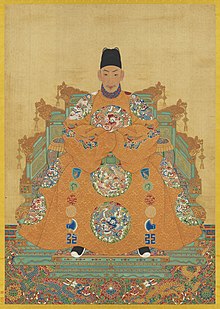Zhengde
Zhengde正德 (born October 26, 1491 , † June 8, 1521 ), maiden name: Zhu Houzhao朱 厚 照, temple name : Wuzong武宗, was the tenth Chinese emperor of the Ming dynasty . He ruled China from 1505 to 1521 .
Life
Zhengde was loved by his father Hongzhi , but he was aware of his only son's mistakes. On his deathbed, he implored his grand secretaries to keep an eye on the young 14-year-old Kaiser, with the words: He is very intelligent, but loves ease and pleasure . The warning should apply. Zhengde disregarded his father's strict Confucianism , showed no interest in government, was impatient with state rituals, and despised Orthodox civil servants . Instead, he preferred to surround himself with his eunuchs , to whom he increasingly granted powers. Zhengde pursued a casual lifestyle consisting of horse riding, archery, hunting, and music. The emperor brought all kinds of entertainers to his court, such as wrestlers, acrobats and magicians. Alarmed about these conditions, the officials tried to banish the most influential eunuchs in 1506. But they failed and the government slipped more and more into the hands of the emperor's sergeants.
The Zhengde Emperor loved women and wine and is said to have been drunk for several days. Prostitutes were even employed as female palace guards, assigned to please the Son of Heaven in troop parades. One of Zhengde's greatest joys was leaving the palace in disguise and wandering the streets of Beijing . The emperor celebrated wild orgies in the capital's brothels. All of this shocked the Confucians at court, but earned the emperor the popular reputation of a womanizer and bon vivant.
That had negative consequences. In 1510 an imperial prince rose up in Ningxia and wanted to depose the monarch, who was considered weak and vicious. The uprising was quickly put down, but two years of banditry and peasant uprisings in Sichuan followed . Zhengde was startled by this, and from then on he devoted himself more intensively to the government. More and more he began to get enthusiastic about the military and to concern himself with security in the Reich. He even adopted 127 officers and gave them the imperial family name of Zhu. He created a small troop out of his eunuchs, which he drilled daily in the palace and trained in the use of artillery . Military clothing suddenly became fashionable at court. In public, one wore armor over the silk robe .
From 1517 to 1519, Zhengde undertook an extensive inspection trip to the north-western border of the empire, where he intensively examined the armies and set up a new headquarters for the border troops. Then he turned his attention to the south. Officials protested at the cost of this sprawling operation. Zhengde confidently ignored her short-sighted criticism and even had some executed. It was not until the time of the emperors Kangxi and Qianlong that such sensible inspection tours were to become commonplace throughout China. The emperor drove down the Imperial Canal and reached Nanjing in 1520 . On its way back to the northern capital, the imperial boat capsized and Zhengde contracted a serious infection . After spitting blood during a ceremony, he died three months later, aged just 30. He did not leave any known children, which resulted in a cousin taking over from him.
Zhengde's unorthodox governance resulted in eunuchs gaining more power over the state. Later relieved by the rule of the favorites, mostly soldiers with no political experience. In desperation, the Grand Secretaries and Ministers intervened and demanded that Zhengde push back the upstart. Indeed with success. The senior grand secretary gradually became the most influential official in the Middle Kingdom. Associated with this was the rise of the provincial officials, whose sphere of influence increased more and more. They secured tax exemption and bought up large estates, which inevitably led to a higher tax burden.
literature
- Frederick W. Mote: Imperial China 900–1800. Harvard, Cambridge 2003, ISBN 0-674-44515-5
- Ann Paludan: Chronicle of the Chinese Emperors. Thames & Hudson, London 1998, ISBN 0-500-05090-2
- Denis Twitchett , Frederick W. Mote: The Cambridge History of China. Vol. 7. The Ming Dynasty 1368-1644. Part 1. University Press, Cambridge 1988, ISBN 0-521-24332-7
| predecessor | Office | successor |
|---|---|---|
| Hongzhi |
Emperor of China 1505 - 1521 |
Jiajing |
| personal data | |
|---|---|
| SURNAME | Zhengde |
| ALTERNATIVE NAMES | Zhu Houzhao (maiden name); 朱 厚 照 (maiden name); Wuzong (temple name); 武宗 (temple name) |
| BRIEF DESCRIPTION | Chinese emperor of the Ming Dynasty |
| DATE OF BIRTH | October 26, 1491 |
| DATE OF DEATH | June 8, 1521 |
